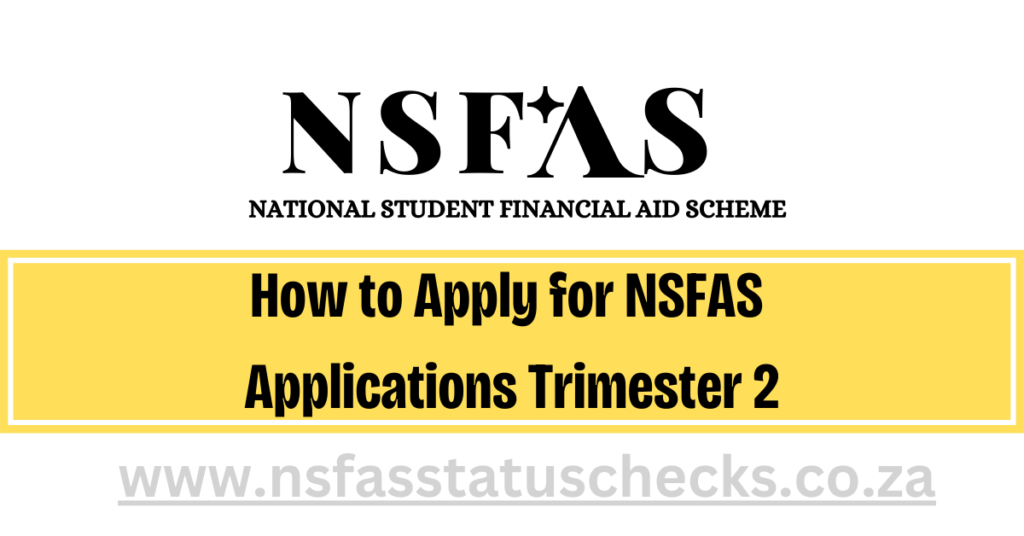Navigating the financial aspects of education can be challenging, but the National Student Financial Aid Scheme (NSFAS) aims to ease the burden for eligible students. In this article, we’ll explore the process of How to Apply for NSFAS Applications during Trimester 2, shedding light on the vital steps and crucial information that prospective applicants need to know.

How to Apply for NSFAS Applications Trimester 2
What is NSFAS?
The National Student Financial Aid Scheme, commonly known as NSFAS, is a government initiative designed to provide financial support to South African students pursuing higher education. Established to bridge the financial gap, NSFAS plays a pivotal role in enabling students to access quality education.
Eligibility Criteria
Before diving into the Trimester 2 application process, it’s crucial to understand the eligibility criteria set by NSFAS. Typically, eligibility is determined based on financial need, academic performance, and citizenship status.
Benefits of NSFAS Funding
NSFAS funding goes beyond covering tuition fees. It extends to providing allowances for accommodation, meals, and study materials, ensuring that students can focus on their education without financial constraints.
Trimester 2 Application Process
Importance of Trimester 2 Applications
While the main intake for NSFAS applications is during the first trimester, Trimester 2 applications cater to those who might have missed the initial deadline or faced unforeseen circumstances. Understanding the importance of Trimester 2 applications ensures that no eligible student is left without financial support.
Eligibility for Trimester 2
Trimester 2 applications are open to students who meet the NSFAS eligibility criteria and have a genuine need for financial assistance. It’s essential to check specific requirements and deadlines set by NSFAS for Trimester 2 applicants.
Required Documents
To streamline the application process, applicants must prepare and submit certain documents. These may include proof of income, identification documents, and academic records. Ensuring all required documents are in order is crucial for a smooth application experience.
Step-by-Step Application Guide
Creating an NSFAS Account
The first step in applying for NSFAS is creating an account on the official NSFAS portal. This account serves as the gateway to accessing and completing the application form.
Filling out the Application Form
Once the account is set up, applicants need to fill out the NSFAS application form. This involves providing personal details, academic information, and details about the chosen course of study.
Uploading Necessary Documents
With the application form completed, the next step is uploading the required documents. This ensures that NSFAS has all the necessary information to assess the application accurately.
Submitting the Application
After thorough review and verification, applicants can submit their NSFAS applications. It’s crucial to double-check all entered information to avoid any discrepancies.
Tips for a Successful Application
Double-Checking Information
Accuracy is paramount when applying for NSFAS. Double-checking all entered information ensures that there are no errors that could potentially impact the application process. It is very important that you follow the steps in order to avoid rejection of your NSFAS application.
Meeting Deadlines
Timeliness is key. Meeting the specified deadlines for Trimester 2 applications is critical to ensuring that the application is considered and processed promptly.
Seeking Assistance if Needed
If applicants encounter challenges during the application process, NSFAS assists with various channels. Seeking help ensures that any issues are addressed promptly.
Common Mistakes to Avoid
Incomplete Applications
One common mistake is submitting an incomplete application. Carefully review the application checklist to ensure all sections are filled out and all required documents are attached.
Incorrect Information
Providing accurate information is essential. Inaccurate details can lead to delays or even disqualification from the NSFAS program.
Missing Deadlines
Missing deadlines is a risk that can be easily avoided by staying informed about the Trimester 2 application timeline. Marking important dates on a calendar can be a helpful reminder.
Benefits of NSFAS Funding
Financial Support for Tuition Fees
One of the primary benefits of NSFAS funding is the coverage of tuition fees, relieving students and their families of a significant financial burden.
Allowances for Accommodation and Meals
Beyond tuition, NSFAS provides allowances for accommodation and meals, recognizing the broader financial needs of students.
Repayment Conditions
Understanding the repayment conditions is crucial for applicants. NSFAS operates on a loan and repayment system, and being aware of these conditions ensures responsible financial planning.
Conclusion
Applying for NSFAS during Trimester 2 is a valuable opportunity for eligible students to secure financial assistance for their education. By understanding the application process, meeting deadlines, and avoiding common mistakes, applicants can increase their chances of a successful outcome.
FAQs
What is NSFAS?
NSFAS, the National Student Financial Aid Scheme, is a government initiative providing financial aid to eligible South African students pursuing higher education.
Who is eligible for Trimester 2 applications?
Trimester 2 applications are open to students who meet NSFAS eligibility criteria and have a genuine financial need.
What documents are required for the application?
Applicants typically need to submit proof of income, identification documents, and academic records.
How long does the application process take?
The duration varies, but timely submission and accurate information contribute to a quicker processing time.
What happens after applying?
After applying, NSFAS reviews the application, verifies the information, and communicates the outcome to the applicant.